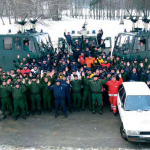Browse: Page 20
By europolice on 28. März 2012
 Die Europäische Kommission hat heute einen Vorschlag zur Errichtung eines Europäischen Zentrums zur Bekämpfung der Cyberkriminalität vorgelegt, das den europäischen Bürgern und Unternehmen im Kampf gegen die zunehmende Bedrohung durch Cyberstraftaten Hilfe leisten soll. Das Zentrum soll im Europäischen Polizeiamt (Europol) in Den Haag eingerichtet werden. Es soll als europäische Schaltstelle für die Bekämpfung von Cyberstraftaten dienen und vorrangig gegen solche illegalen Online-Tätigkeiten organisierter krimineller Vereinigungen vorgehen, die hohe illegale Erträge abwerfen, darunter Online-Betrug mit gestohlenen Kreditkarten und Bankkontendaten.
Die Europäische Kommission hat heute einen Vorschlag zur Errichtung eines Europäischen Zentrums zur Bekämpfung der Cyberkriminalität vorgelegt, das den europäischen Bürgern und Unternehmen im Kampf gegen die zunehmende Bedrohung durch Cyberstraftaten Hilfe leisten soll. Das Zentrum soll im Europäischen Polizeiamt (Europol) in Den Haag eingerichtet werden. Es soll als europäische Schaltstelle für die Bekämpfung von Cyberstraftaten dienen und vorrangig gegen solche illegalen Online-Tätigkeiten organisierter krimineller Vereinigungen vorgehen, die hohe illegale Erträge abwerfen, darunter Online-Betrug mit gestohlenen Kreditkarten und Bankkontendaten.
Die Sachverständigen der EU sollen zudem Cyberstraftaten bei elektronischen Bankgeschäften und Online-Buchungen vorbeugen und so das Vertrauen der Verbraucher in den elektronischen Geschäftsverkehr stärken. Ein Schwerpunkt der Tätigkeit des Zentrums wird der Schutz der Nutzerprofile sozialer Netze vor digitalem Missbrauch sein, wodurch ein Beitrag zur Bekämpfung des Identitätsdiebstahls im Internet geleistet werden soll. Ein weiterer Schwerpunkt ist die Bekämpfung von Cyberstraftaten, die eine schwere Schädigung ihrer Opfer bewirken (z.B. über das Internet begangene sexuelle Ausbeutung von Kindern), sowie von Cyberangriffen auf wichtige Infrastrukturen und Informationssysteme in der EU. Continue reading „Europol rüstet auf: EU-Zentrum zur Bekämpfung der Cyberkriminalität“
Posted in Europol, Software/ IT
By europolice on 27. März 2012
 Hautfarbe und ein Erscheinungsbild als “Ausländer” sind zulässige Kriterien für eine Personenkontrolle durch die Bundespolizei. Dies hat das Verwaltungsgericht Koblenz entschieden. Das Gericht bestätigt damit die Praxis eines Grenzbeamten, gezielt Reisende nach ihrer Hautfarbe zu kontrollieren.
Hautfarbe und ein Erscheinungsbild als “Ausländer” sind zulässige Kriterien für eine Personenkontrolle durch die Bundespolizei. Dies hat das Verwaltungsgericht Koblenz entschieden. Das Gericht bestätigt damit die Praxis eines Grenzbeamten, gezielt Reisende nach ihrer Hautfarbe zu kontrollieren.
Der Bundespolizist hatte einen Reisenden kontrolliert, der ihm “ausländisch” erschien. Das wollte der Mann nicht mit sich machen lassen. Er wurde auf die Wache gebracht und durchsucht. Hieraus entspann sich ein Beleidigungsprozess gegen den Reisenden und eine Klage gegen die Bundespolizei auf Feststellung, dass die Maßnahmen rechtswidrig waren. (weiter auf lawblog.de)
Posted in Various
By europolice on 27. März 2012
At a meeting of the EU Council’s Law Enforcement Working Party held on 15 February 2012 in Brussels the Danish Presidency, supported by Europol, presented a discussion paper that is alarming in several aspects. The paper on „intelligence-led policing through closer cooperation with Europol in the fight against itinerant criminal groups“ shows that only a minority of EU Member States are making use of the Europol Information System (EIS). Hence, the paper promotes the use of the EIS for the „fight against itinerant criminal groups“.[1]
„Itinerant crime“ has been on top of the agenda of EU home affairs since summer 2010 when Belgium took over the EU Presidency and used it, as announced by policy statement of the Belgian Federal Police, as „an opportunity to increase the recognisability of the phenomenon on an international level“ and „make sure itinerant offenders are given the attention of international institutions, proportionally to the social impact they cause“.[2] The definition offered by the Belgian police reads as following: Continue reading „Targeting Roma: How the EU security apparatus is mobilised for the „fight against itinerant crime““
Posted in English, European Police
By europolice on 27. März 2012
 1.1) Why destroy cctv cameras ?
1.1) Why destroy cctv cameras ?
Trust your instincts, but if you need intellectual justification then:
„The gaze of the cameras does not fall equally on all users of the street but on those who are stereotypical predefined as potentially deviant, or through appearance and demeanour, are singled out by operators as unrespectable. In this way youth, particularly those already socially and economically marginal, may be subject to even greater levels of authoritative intervention and official stigmatisation, and rather than contributing to social justice through the reduction of victimisation, CCTV will merely become a tool of injustice through the amplification of differential and discriminatory policing.“
„an instrument of social control and the production of discipline; the production of ‚anticipatory conformity‘; the certainty of rapid deployment to observed deviance and; the compilation of individualised dossiers of the monitored population.“ Continue reading „How to destroy CCTV cameras?“
Posted in English, Was tun?
By europolice on 26. März 2012
 Zum Jahrestag des Tods von MigrantInnen: die Informationen zu dem Drama müssen veröffentlicht werden
Zum Jahrestag des Tods von MigrantInnen: die Informationen zu dem Drama müssen veröffentlicht werden
Presse-Erklärung, 26. März 2012
Briefe mit der Forderung nach Information wurden am 26. März 2012 an das Flottenkomando der Nato in Neapel (Italien) und an die Verteidigungsminister Frankreichs, Großbritanniens, Italiens, Spaniens, der Vereinigten Staaten und Kanadas verschickt.
„Der tragische Verlust von Menschenleben im Mittelmeer im Lauf des Jahres 2011 – der UNHCR schätzt, dass mindestens 1.500 Personen im letzten Jahr bei der Überfahrt umgekommen sind – macht abgestimmte Anstrengungen nötig, um nachzuforschen und um zu verhindern, dass sich solche Tragödien in Zukunft wiederholen können“, betonen die Unterzeichner der Briefe.
Die Unterzeichner sind Human Rights Watch, die Internationale Liga für Menschenrechte, das Euro-Afrikanische Netzwerk Migreurop, das Euro-Mediterranean Human Rights Network (EMHRN), der Zusammenschluss Boats 4 People und die französische Organisation GISTI. Die Mitgliedsorganisationen der Internationalen Liga für Menschenrechte, von Migreurop und REMDH haben die Briefe an Frankreich, Italien, Spanien und Kanada unterzeichnet. Continue reading „An die NATO: Klärende Antwort zu den Toten im Mittelmeer!“
Posted in Border Control, Was tun?
By europolice on 23. März 2012
 Der Himmel gehört allen, nicht nur dem Militär. Daher sollten sich auch Journalisten der Technik Drohne bemächtigen, finden Aktivisten und sammeln Infos aus der Luft.
Der Himmel gehört allen, nicht nur dem Militär. Daher sollten sich auch Journalisten der Technik Drohne bemächtigen, finden Aktivisten und sammeln Infos aus der Luft.
Drohnen, fliegende Roboter, die aus der Luft stunden-, ja tagelang beobachten können, entwickeln sich zum Arbeitsgerät von Journalisten. So wird in den USA an einer Universität an einer JournoDrone gebastelt; an einer anderen Hochschule entsteht gar ein ganzes Labor für Drohnenjournalismus.
Die Entwicklung dieser unbemannten Fluggeräte folgt dabei einem klassischen Muster: Eine neue Technik wird für das Militär entwickelt, hier eben Drohnen. Im nächsten Schritt nutzen Polizeibehörden die Systeme. In Deutschland zum Beispiel geschieht das seit ungefähr fünf Jahren. Etwa beim Castortransport im Herbst 2010.
Und schließlich, wenn die Produktionskosten soweit gesunken sind, dass viele sich die Technik leisten können und sich langsam massenhaft Menschen für das Produkt interessieren, erreicht es den zivilen Markt. Erst die Bastler, Hacker und Schrauber, danach auch alle anderen. (weiter auf zeit.de)
Posted in Drohnen, Was tun?
By europolice on 23. März 2012
Slain soldier’s ad for motorcycle had key role in manhunt
By John Leyden
The IP address of a computer used to view a motorbike sales ad posted by an early victim of the Toulouse gunman played a vital role in narrowing down Mohamed Merah as the main suspect in a series of attacks that have horrified France, it has emerged.
French soldier Imad Ibn-Ziaten posted a video of the motorbike he wanted to sell online. The paratrooper was killed on 11 March after he invited someone who posed as a prospective buyer to his house.
Le Monde reports (Google translation here) that the ad was viewed by about 500 people. Cyber police narrowed down the list of likely suspects to those who lived in and around Toulouse in south-west France. This search was intensified after Ibn-Ziaten’s assassination was linked to the slaughter of three children and a rabbi at a Jewish school in Toulouse on Monday, 19 March. (more on theregister.co.uk)
Posted in English, European Police, Software/ IT
By europolice on 23. März 2012
 „There is a solid understanding between Tunisia and Italy in matters of fight against illegal immigration. We think that there is no problem to forge ahead on the path of integration and opening of the frontiers. We only need to discuss these issues more thoroughly,“ Italy’s Interior Minister Maria Cancellieri said on Thursday in Tunis.
„There is a solid understanding between Tunisia and Italy in matters of fight against illegal immigration. We think that there is no problem to forge ahead on the path of integration and opening of the frontiers. We only need to discuss these issues more thoroughly,“ Italy’s Interior Minister Maria Cancellieri said on Thursday in Tunis.
„Our policy rests on respect of human rights. Nonetheless, when it comes to border control and security, we are very firm and we hope to work together with our Tunisian friends on the issue,“ she added at the end of her meeting with Foreign Minister Rafik Abdessalem.
The meeting allowed to review the situation of the missing illegal Tunisian emigrants and to examine an Italian project on people’s movement.
The Tunisian side requested, on the occasion, the renewal of the residence visa granted by the Italian authorities to more than 8,000 Tunisian nationals who had illegally migrated to Italy after the Revolution. Continue reading „Italian Interior Minister Cancellieri: „We are working together on immigration, frontier security issues““
Posted in Border Control, English
By europolice on 23. März 2012
By Doug Schmidt
Windsor’s career criminals are being put on notice – you could be under police surveillance from the moment you step out of jail.
The Windsor Police Service released its annual crime statistics report Thursday and, almost across the board, crime rates were down in 2011. In some categories, the drop was substantial.
Last year’s two attempted murders were the fewest since 2004. Assaults were down 15 per cent (assaults against police dropped by a quarter, from 104 incidents to 76); vehicle thefts were down 17 per cent, and youth crimes have declined 46 per cent in four years.
Robberies were down more than nine per cent and criminal harassment complaints fell 15 per cent.
The city’s property crimes are down 44 per cent from seven years ago, including a nine per cent drop in 2011.
The numbers are „absolutely off the chart … really incredible,“ Deputy Chief Jerome Brannagan told members of the police board. Continue reading „Police data miners help keep tabs on criminals“
Posted in English, European Police, Software/ IT
By europolice on 22. März 2012
 Matthias Monroy
Matthias Monroy
Mit immer mehr Maßnahmen verfolgen EU-Institutionen grenzüberschreitende linke Bewegungen. Dem BKA haben es angebliche „Euro-Anarchisten“ besonders angetan
Seit 2002 ist die EU-Polizeiagentur für die Verfolgung von Umwelt- und Tierrechtsaktivismus bekannt. Jetzt bekommt die Kriminalisierung internationaler politischer Kampagnen eine neue Facette: Eine Konferenz von Europol nimmt unter anderem verkehrspolitische und antirassistische Aktivisten aufs Korn. Um die Kompetenzen der Behörden zu erweitern, werden die Ausgeforschten mit Absendern von Briefbomben gleichgesetzt. Auch der EU-Geheimdienst ist mit von der Partie.
Europol organisiert eine Konferenz zu anarchistischen Bewegungen in der Europäischen Union. Dies berichtete ein Sprecher der EU-Polizeiagentur letzte Woche in der Ratsarbeitsgruppe „Terrorismus“. Demnach soll die Veranstaltung am 25. April stattfinden. Über den Ort wurden keine Angaben gemacht. Gewöhnlich finden derartige Zusammenkünfte aber am Sitz der Agentur in Den Haag statt.
Im Sommer 2011 bezog Europol einen ausschweifenden Neubau. Dort haben fortan neben den umfangreichen Informationssystemen und forensischen Abteilungen auch die Verbindungsbeamten der 27 EU-Mitgliedstaaten sowie von weiteren neun Regierungen Platz (Wer kontrolliert Europol?). (weiter auf heise.de)
Posted in BKA, Datenbanken, European Police, Europol, Secret Service
By europolice on 21. März 2012
Global security company to showcase its Border Guard Surveillance Vehicle for first time in region
Cassidian, a leading global provider of cutting edge technology in defence and security, will be using the third DIMDEX 2012 in Qatar to showcase the first exhibition of a Border Guard Surveillance Vehicle (BGSV). The BGSV provides an integrated mobile surveillance solution together with a mobile command and control centre.
In the Middle East and worldwide, Cassidian is the market leader in delivering consistent and effective security solutions to optimize ways of detecting, preventing and responding to threats such as terrorism, piracy or natural disaster.
Marc Gentil, CEO Cassidian Qatar, said: “Cassidian is already delivering integrated surveillance solutions for GCC countries. At DIMDEX, Cassidian will present command, control, communications, computer, intelligence, surveillance and automatic electronic investigation system (C4ISR) which can secure and protect territorial waters, strategic areas and terrestrial borders from any illegal security violations.“ Continue reading „Cassidian at DIMDEX 2012 in Qatar“
Posted in Border Control, English, Robotik
By europolice on 21. März 2012
 Der Hessische Innenminister Boris Rhein unterzeichnete heute im Schloss Biebrich gemeinsam mit den Innenministern der Länder Rheinland-Pfalz, Roger Lewentz, Baden-Württemberg, Reinhold Gall, und dem Saarland, Stephan Toscani, einer Vereinbarung zur länderübergreifenden Zusammenarbeit der Polizeien. Dies ist die erste derartige umfassende länderübergreifende Zusammenarbeit. Mit dieser Kooperationsvereinbarung stellen alle vier Bundesländer eine höhere Verfügbarkeit ihrer Polizistinnen und Polizisten sicher, legen einheitliche Standards fest und steigern zugleich die Qualität sowie die Kompetenz auf dem Gebiet der Kriminalitätsbekämpfung.
Der Hessische Innenminister Boris Rhein unterzeichnete heute im Schloss Biebrich gemeinsam mit den Innenministern der Länder Rheinland-Pfalz, Roger Lewentz, Baden-Württemberg, Reinhold Gall, und dem Saarland, Stephan Toscani, einer Vereinbarung zur länderübergreifenden Zusammenarbeit der Polizeien. Dies ist die erste derartige umfassende länderübergreifende Zusammenarbeit. Mit dieser Kooperationsvereinbarung stellen alle vier Bundesländer eine höhere Verfügbarkeit ihrer Polizistinnen und Polizisten sicher, legen einheitliche Standards fest und steigern zugleich die Qualität sowie die Kompetenz auf dem Gebiet der Kriminalitätsbekämpfung.
„Diese bisher einmalige Kooperationsvereinbarung ist eine große Chance für alle beteiligten Bundesländer, wir alle können davon nur profitieren. Zudem spart Hessen mit dieser Maßnahme Steuergelder in erheblichem Umfang, ohne an Sicherheit einzubüßen. Hessen kann beispielsweise die Präsenz der Beamtinnen und Beamten durch die Kooperation mit Rheinland-Pfalz im Bereich der Wasserschutzpolizei sogar erhöhen, weil wir die bisherige Personalstärke bei der Wasserschutzpolizei in Hessen beibehalten“, so Innenmister Boris Rhein. Continue reading „Engere Kooperation im Bereich der Polizei“
Posted in European Police
By europolice on 20. März 2012
 Das Forschungsprogramm für die zivile Sicherheit
Das Forschungsprogramm für die zivile Sicherheit
Jens Kany
Am 25.01.2012 hat die Bundesregierung die Fortführung des Sicherheitsforschungsprogramms ‚Forschung für die zivile Sicherheit‘ bis 2017 beschlossen. Die Fortführung des Programms gibt Anlass, zurückzublicken und die bisherige Entwicklung der ersten Phase zu analysieren. Dies geschieht in drei Schritten. (1) Zunächst wird der europäische Rahmen des Programms abgesteckt. Das Forschungsprogramm für die zivile Sicherheit ist als Erweiterung und Vertiefung des European Security Research Programme (ESRP) gedacht, welches von der EU-Kommission angestoßen wurde. Mit Bezug auf die hervorragende Studie Arming Big Brother von Ben Hayes wird aufgezeigt, dass es bei diesem Programm nicht um die (Sicherheits-)Interessen der Bürgerinnen und Bürger Europas geht, sondern allein um das Profitinteresse der Rüstungskonzerne. (2) In einem zweiten Schritt wird das Forschungsprogramm für die zivile Sicherheit des BMBF genauer untersucht. Der Einfluss der Rüstungsindustrie bei Planung und Durchführung des Programms und der Einfluss des Fraunhofer-Verbunds Verteidigungs- und Sicherheitsforschung VVS stechen ins Auge. An welchen Forschungsprojekten sind Rüstungskonzerne beteiligt, an welchen wehrforschende Institute der Fraunhofer-Gesellschaft? (3) Abschließend wird die Rolle der Universitäten im Rahmenprogramm des BMBF unter die Lupe genommen. Unter dem Regime des akademischen Kapitalismus sind Universitäten verstärktem Wettbewerb ausgesetzt. Sinkende staatliche Grundfinanzierung führt zum Kampf um Drittmittel und zur Erschließung neuer Einnahmequellen. Forschungsprogramme wie das für die zivile Sicherheit erfüllen unter diesem Regime den Zweck, staatliche Gelder gezielt und zweckgebunden zu verteilen. Auf diese Weise können politisch gewollte Forschungslinien verstärkt und politisch ungewollte reduziert werden. Unter einem solchen Regime werden Universitäten zunehmend in militärisch relevante Forschung hineingetrieben. (weiter auf imi-online.de)
Posted in Drohnen, European Police, Forschung, Robotik, Software/ IT, Space
By europolice on 20. März 2012
 BY KIM JANSSEN
BY KIM JANSSEN
The city of Chicago has rejected a request by anti-war protesters to march through downtown Chicago on May 20, the first day of the NATO summit.
The protesters already had a permit to march along the same route — from Daley Center Plaza to McCormick Place — one day earlier. That was the date the now-moved G-8 summit was to have begun.
But when President Barack Obama moved the G-8 conference earlier this month to Camp David, Md., the protesters put in an application for a city permit that asked to move their march back a day, to Sunday, May 20, to coincide with the opening of the NATO summit.
The Chicago Department of Transportation now says the planned protest would “substantially and unnecessarily interfere with traffic” if it were held on that Sunday. (more on suntimes.com)
Posted in Crowd Control, English, European Police, Policing Major Events
By europolice on 19. März 2012
 Metropolitan Police Service
Metropolitan Police Service
Strategic Review into the Disorder of August 2011
Operation Kirkin was the Metropolitan Police Service (MPS) response to the pan-London disorder which took place in early August 2011. Assistant Commissioner Lynne Owens has reviewed Operation Kirkin on behalf of the Commissioner. Following her appointment as Chief Constable of Surrey Police, Assistant Commissioner Mark Rowley assumed responsibility for finalising the review and driving through its recommendations.
The overarching objective of the Operation Kirkin Strategic Review was:
‘To develop a detailed understanding of the MPS response to significant public disorder in London between Thursday 4th August and Friday 19th August 2011 in order to inform future policing operations by ensuring organisational learning is recognised and developed for the future. This learning and the subsequent costed plans will be shared promptly, as appropriate, with key internal and external stakeholders.’ (pdf at content.met.police.uk)
Posted in Crowd Control, English, European Police, Justiz, Kommunikation, Software/ IT
By europolice on 19. März 2012

Gill Hitchcock
The Metropolitan Police Service will use software from the 1980s to coordinate the command and communications of its policing operations during the London Olympic Games.
The software, known as MetOps, is installed in the force’s special operations room (SOR), the central control room providing communications support during more than 500 major incidents and events each year, according to a report by the Met into the riots of August 2011.
MetOps, a messaging and recording system, was not designed for dynamic incident management, and means commanders have no simple way to view the latest situation during an evolving incident, the report says.
The age of MetOps system means that it is not linked directly to the software used in the force’s central communications centre, known as the computer aided dispatch (CAD) system. (more on guardian.co.uk)
Posted in Crowd Control, English, European Police, Kommunikation, Software/ IT
By europolice on 19. März 2012
London, Ont. police expect to make more arrests after a mob of some 1,000 people torched a TV news van and pelted officers with bricks and beer bottles during a Saturday night riot.
Eleven people, seven of them Fanshawe College students, were arrested after a St. Patrick’s Day party in the city’s east end turned into what police are calling „the worst case of civil disobedience“ in London’s history.
Police said Sunday they are poring over videos, photos and witness accounts posted on social media to find more culprits.
Some of the rioters have bragged about their involvement on Facebook and Twitter. (more on m.ctv.ca)
Posted in English, European Police, Kommunikation
By europolice on 18. März 2012
 Throughout May and June of this year, Warsaw is to become the exhibition center of European apartheid. During these months, as Euro 2012 fans take in the international atmosphere of the tournament in beer parks specially set up for them around the city, Frontex, headquartered in Warsaw at 1, United Nations Plaza will celebrate its 7th anniversary. For last year’s birthday festivities the agency organized „European Border Guard’s Day“, a networking event with film screenings and presentations of the newest border control technologies. This May, however, is of particular importance as Euro 2012 will allow Warsaw itself to become a showcase of segregation and discrimination, or the tactics of human selection predicated by market value that European authorities call migration management. What else but their ability to consume and be consumed makes this expected wave of 800,000-1 million not a typhoon greater than any weather predicament warranting Frontex intervention on Lampedusa, but a large group of „newcomers“? In light of the chauvinism of the European authorities to the people seeking refuge during the revolutions of this past year, Euro 2012 is to be a display, ad absurdum, of their lame dictatorial practices: the self-proclaimed referees of democracy present apartheid under the guise of games. Continue reading „Anti-Frontex Days: Stand up against Euro Apartheid!“
Throughout May and June of this year, Warsaw is to become the exhibition center of European apartheid. During these months, as Euro 2012 fans take in the international atmosphere of the tournament in beer parks specially set up for them around the city, Frontex, headquartered in Warsaw at 1, United Nations Plaza will celebrate its 7th anniversary. For last year’s birthday festivities the agency organized „European Border Guard’s Day“, a networking event with film screenings and presentations of the newest border control technologies. This May, however, is of particular importance as Euro 2012 will allow Warsaw itself to become a showcase of segregation and discrimination, or the tactics of human selection predicated by market value that European authorities call migration management. What else but their ability to consume and be consumed makes this expected wave of 800,000-1 million not a typhoon greater than any weather predicament warranting Frontex intervention on Lampedusa, but a large group of „newcomers“? In light of the chauvinism of the European authorities to the people seeking refuge during the revolutions of this past year, Euro 2012 is to be a display, ad absurdum, of their lame dictatorial practices: the self-proclaimed referees of democracy present apartheid under the guise of games. Continue reading „Anti-Frontex Days: Stand up against Euro Apartheid!“
Posted in Border Control, English, Was tun?
By europolice on 18. März 2012
Kundgebung am Flughafen Berlin-Tegel am 30.03.2012 um 17:00 Uhr
Und zur gleichen Zeit Demonstrationen in den Flughäfen München, Düsseldorf, Frankfurt und Hamburg
Fast 7200 Flüchtlinge wurden 2011 aus Deutschland in ihre (vermeintlichen) Herkunftsstaaten abgeschoben. Zusätzlich wurden aber auch rund 2900 Abschiebungen innerhalb Europas durchgeführt – so wurden beispielsweise Bürgerkriegsflüchtlinge aus Somalia nach Italien, oder afghanische Flüchtlinge nach Ungarn abgeschoben.
Grund dafür ist die Dublin 2-Verordnung. Diese legt fest, welches europäische Land für die Durchführung des Asylverfahrens zuständig ist. Einfach gesagt ist es der Staat, der „verschuldet“ hat, dass ein Flüchtling nach Europa gelangen konnte, und Europa sich überhaupt mit den Schutzsuchenden beschäftigen muss – trotz militarisierter Außengrenzen. Continue reading „Abschiebungen innerhalb Europas stoppen! – Dublin 2 kippen!“
Posted in Border Control, Was tun?
By europolice on 15. März 2012
detainees stories collected by Migreurop on the 08/03/2012
« We need help, we are more than fifty detainees in the Arad detention centre, Romania. We are asylum seekers and they put us in detention
Some have been here for a month, others for 7, 8, 9 months. We are a group of men and one pregnant woman.
We are badly treated, worse than animals. The detention guards are beating us up, badly. This happens often. For example, Tuesday this week, on 6 March 2012, some policemen wanted to spray tear gas on one detainee, we don’t even know why. They brought him to the isolation cell, downstairs, to beat him up. We heard him shout from our cells. Continue reading „Arad camp (Romania) : „We are in hell““
Posted in Border Control, English
 Die Europäische Kommission hat heute einen Vorschlag zur Errichtung eines Europäischen Zentrums zur Bekämpfung der Cyberkriminalität vorgelegt, das den europäischen Bürgern und Unternehmen im Kampf gegen die zunehmende Bedrohung durch Cyberstraftaten Hilfe leisten soll. Das Zentrum soll im Europäischen Polizeiamt (Europol) in Den Haag eingerichtet werden. Es soll als europäische Schaltstelle für die Bekämpfung von Cyberstraftaten dienen und vorrangig gegen solche illegalen Online-Tätigkeiten organisierter krimineller Vereinigungen vorgehen, die hohe illegale Erträge abwerfen, darunter Online-Betrug mit gestohlenen Kreditkarten und Bankkontendaten.
Die Europäische Kommission hat heute einen Vorschlag zur Errichtung eines Europäischen Zentrums zur Bekämpfung der Cyberkriminalität vorgelegt, das den europäischen Bürgern und Unternehmen im Kampf gegen die zunehmende Bedrohung durch Cyberstraftaten Hilfe leisten soll. Das Zentrum soll im Europäischen Polizeiamt (Europol) in Den Haag eingerichtet werden. Es soll als europäische Schaltstelle für die Bekämpfung von Cyberstraftaten dienen und vorrangig gegen solche illegalen Online-Tätigkeiten organisierter krimineller Vereinigungen vorgehen, die hohe illegale Erträge abwerfen, darunter Online-Betrug mit gestohlenen Kreditkarten und Bankkontendaten.











